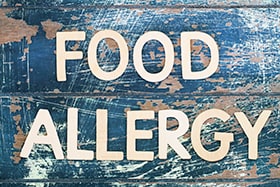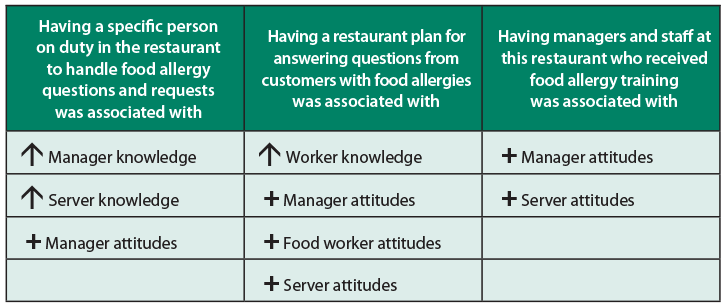
Food Allergies: Knowledge and Attitudes of Restaurant Managers and Staff
EHS-Net Findings and Recommendations
EHS-Net Recommends

In general, managers, food workers, and servers were familiar with food allergies and had positive attitudes about accommodating customers with food allergies. However, we found important gaps.
Nearly all restaurant staff knew the symptoms of an allergic reaction and knew to call 911 in these situations. But more than one in ten managers and staff incorrectly believed that someone with a food allergy could safely eat a small amount of that allergen.
We recommend restaurants implement three key restaurant practices linked with better food allergyknowledge and more positive attitudes about accommodating customers with food allergies:
- Having a plan for answering questions from customers with food allergies.
- Choosing a specific person in the restaurant to handle food allergy questions and requests.
- Training staff on food allergies.
Why This Study Was Done
Food allergies are a growing food safety issue. One in thirteen children have food allergies, and one in twenty-five adults have food allergies.
Dining out can be difficult for people with food allergies because they must rely on restaurant staff to properly prepare their allergen-free meals. A survey of people with food allergies found that one in three had a reaction in a restaurant.
Understanding manager, food worker, and server knowledge and attitudes about food allergies can help us identify practices to reduce the risk of food allergic reactions in restaurants.

What the Study Described
The purpose of this study was to
- Describe knowledge and attitudes of restaurant managers, food workers, and servers about food allergies.
- Identify factors linked with their knowledge and attitudes.
What the Study Found
Restaurant managers and staff were generally knowledgeable about food allergies and had positive attitudes about accommodating customers with food allergies. However, some staff
- Incorrectly believed that customers with food allergies could safely eat a small amount of the food they are allergic to.
- Thought that their restaurant might not be able to respond to a food allergy emergency.
Several restaurant practices were consistently linked with managers, food workers, and servers having better food allergy knowledge and more positive attitudes about accommodating customers with food allergies.

What Is EHS-Net?
This study was conducted by the Environmental Health Specialist Network (EHS-Net). EHS-Net is a federally funded collaboration of federal, state, and local environmental health specialists and epidemiologists working to better understand the environmental causes of foodborne illness.
Want More Information?
Food allergy knowledge and attitudes of restaurant managers and staff: an EHS-Net study[PDF – 176 KB] (scientific article this plain language summary is based on)
Food Allergies: Knowledge and Attitudes of Restaurant Managers and Staff[PDF – 138 KB] (fact sheet version of this page)
How Restaurants Address Food Allergies[PDF – 223 KB] (plain language summary of another food allergy article)
Food Allergens Study (study information)
More EHS-Net publications by Study Topic or Citation


































No hay comentarios:
Publicar un comentario